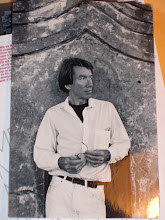The Terrible Truth
One day the scientists discovered a truth so terrifying
they closed their laboratories,
returned their grant money,
resigned all their positions,
and retreated en masse to the desert
after taking a vow of silence.
The internet erupted with chatter: “What is it?
What is this thing that made all the scientists on earth lose their minds?”
Thousands of guesses blackened the screens of cyberspace,
but not one guessed what.
“Any lie at all would be preferable,”
one of the last scientists was heard muttering,
“Any lie at all . . . If only we didn’t know . . . !”
A young man overheard him,
and sneered.
“Cowards,” he thought
as he planned to break into the boarded-up laboratories,
discover this “terrifying truth,”
and steal, like a punk Prometheus,
the fire from the abandoned altars of the gods.
And he did. And the next day they watched him walking the streets,
his eyes blind with the despair of what they had seen.
The internet erupted with chatter: “What is it? What is it?”
No one guessed, and the young man
would only say, “Any lie at all . . . any lie at all . . .”
A thousand years passed. The laboratories had been rebuilt as temples
and people lived in little tribes among the ruins of a civilization rumored to have been
built by giants,
lived on berries and nuts and what they could kill in the hunt, and died young,
and they worshiped a god made of feathers and grass, with the head of a porpoise, the
legs of a tiger, the wings of a falcon, and the torso of a man;
his name was whispered in the darkness of his temples by worshippers who had
proven their faithfulness by eating the hearts out of the breasts of living children.
“O En-i-ly-atal, save us!” they prayed in the darkness. “Save us, O En-i-ly-atal!”
One day the scientists discovered a truth so terrifying
they closed their laboratories,
returned their grant money,
resigned all their positions,
and retreated en masse to the desert
after taking a vow of silence.
The internet erupted with chatter: “What is it?
What is this thing that made all the scientists on earth lose their minds?”
Thousands of guesses blackened the screens of cyberspace,
but not one guessed what.
“Any lie at all would be preferable,”
one of the last scientists was heard muttering,
“Any lie at all . . . If only we didn’t know . . . !”
A young man overheard him,
and sneered.
“Cowards,” he thought
as he planned to break into the boarded-up laboratories,
discover this “terrifying truth,”
and steal, like a punk Prometheus,
the fire from the abandoned altars of the gods.
And he did. And the next day they watched him walking the streets,
his eyes blind with the despair of what they had seen.
The internet erupted with chatter: “What is it? What is it?”
No one guessed, and the young man
would only say, “Any lie at all . . . any lie at all . . .”
A thousand years passed. The laboratories had been rebuilt as temples
and people lived in little tribes among the ruins of a civilization rumored to have been
built by giants,
lived on berries and nuts and what they could kill in the hunt, and died young,
and they worshiped a god made of feathers and grass, with the head of a porpoise, the
legs of a tiger, the wings of a falcon, and the torso of a man;
his name was whispered in the darkness of his temples by worshippers who had
proven their faithfulness by eating the hearts out of the breasts of living children.
“O En-i-ly-atal, save us!” they prayed in the darkness. “Save us, O En-i-ly-atal!”


0 Comments:
Post a Comment
<< Home